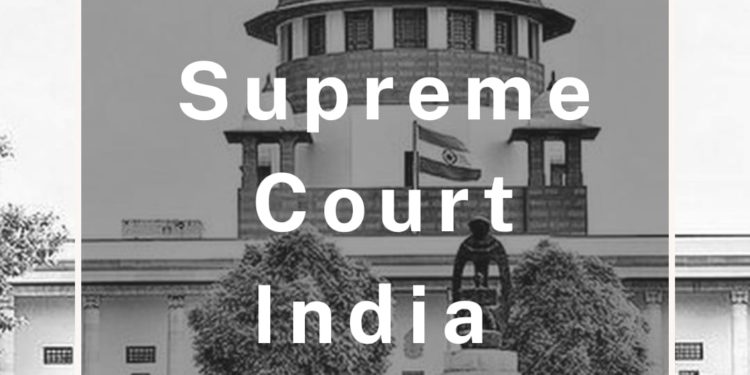The Supreme Court on Thursday clarified that a woman has the right to live in a shared household where she has lived with the husband, even if the house is owned by the husband’s ‘relative’. The verdict can be interpreted that a wife is entitled to live in a shared household belonging to her husband’s relative, irrespective of whether either spouse has any right title or interest in the shared household.
The top court’s verdict came on a dispute between a father-in-law and his daughter-in-law who is embroiled in divorce proceedings with her husband. The top court overruled its 2006 verdict passed by a division bench in SR Batra vs Taruna Batra where it was held, that the wife is entitled only to claim a right to reside in a shared household only if the house belonged to or was taken on rent by the husband, or the house which belongs to the joint family of which the husband is a member.
Case:
In this case, Satish Chander Ahuja (father-in-law) filed a Suit against Sneha Ahuja (daughter in law) for mandatory and permanent injunction and also for recovery of damages/mesne profit.
In his plaint, he pleaded that defendant has filed a complaint under the Protection of Women from Domestic Violence Act, 2005 in which interim order directing the plaintiff not to alienate and not to dispossess the defendant without order of the competent court has been passed.
He further pleaded that the status of occupation of defendant as a daughter-in-law during subsistence of marriage with the son could be said to be permissive in nature and defendant is not entitled to claim a right of residence against the plaintiff, i.e., her father-in-law who has no obligation to maintain her during the lifetime of her husband.
Arguments By Daughter-in-Law
In her written statement, the daughter in law claimed that the suit property is a shared household as per provision of Section 2(s) of the Act, 2005, and thus she has right to stay/reside in the shared household.
Trial Court & High Court Verdict
The trial court decreed the suit filed by Ahuja by allowing his application filed under Order XII Rule 6 CPC., taking note of the admission made by the defendant in her pleadings filed in the domestic violence case, that the plaintiff to be the owner of the suit property.
The High Court, while setting aside the Trial Court judgment, observed that question the suit could not have been simply decreed by the Trial Court on the basis of the title without weighing the effect of the statutory right in favour of the the daughter in law. The High Court remanded the case back to Trial Court by issuing some directions.
What Does Supreme Court Verdict Say?
The woman must live or at any stage have lived in a shared household in a domestic relationship. However, this does not mean that a woman has the right to live in any property owned by a husband’s relative.
The three-judge bench led by Justice Ashok Bhushan, R. Subhash Reddy and MR Shah said this court had incorrectly interpreted section 2(s) of the Protection of Women from Domestic Violence (DV) Act, 2005.
Disagreeing with the Batra judgment observations, the bench said that apprehensions expressed by the bench were not true. The court said:
The shared household is contemplated to be the household, which is a dwelling place of aggrieved person in present time. When we look into the different kinds of orders or reliefs, which can be granted on an application filed by aggrieved person, all orders contemplate providing protection to the women in reference to the premises in which aggrieved person is or was in possession. Our above conclusion is further fortified by statutory scheme as delineated by Section 19 of the Act, 2005.
In event, the definition of shared household as occurring in Section 2(s) is read to mean that all houses where the 60 aggrieved person has lived in a domestic relationship alongwith the relatives of the husband shall become shared household, there will be number of shared household, which was never contemplated by the legislative scheme. The entire Scheme of the Act is to provide immediate relief to the aggrieved person with respect to the shared household where the aggrieved person lives or has lived.
As observed above, the use of the expression “at any stage has lived” was only with intent of not denying the protection to aggrieved person merely on the ground that aggrieved person is not living as on the date of the application or as on the date when Magistrate concerned passes an order under Section 19. The apprehension expressed by this Court in paragraph 26 in S.R. Batra Vs. Taruna Batra (supra), thus, was not true apprehension and it is correct that in event such interpretation is accepted, it will lead to chaos and that was never the legislative intent. We, thus, are of the considered opinion that shared household referred to in Section 61 2(s) is the shared household of aggrieved person where she was living at the time when application was filed or in the recent past had been excluded from the use or she is temporarily absent.
The apex court further added,
The observation of this Court in S.R. Batra Vs. Taruna Batra (supra) that definition of shared household in Section 2(s) is not very happily worded and it has to be interpreted, which is sensible and does not lead to chaos in the society also does not commend us. The definition of shared household is clear and exhaustive definition as observed by us.
The object and purpose of the Act was to grant a right to aggrieved person, a woman of residence in shared household. The interpretation which is put by this Court in S.R. Batra Vs. Taruna Batra (supra) if 64 accepted shall clearly frustrate the object and purpose of the Act. We, thus, are of the opinion that the interpretation of definition of shared household as put by this Court in S.R. Batra Vs. Taruna Batra (supra) is not correct interpretation and the said judgment does not lay down the correct law.
What Is A Shared Household?
According to section 2(s) of the DV Act, a “shared household” means a household where the wife lives or at any stage has lived in a domestic relationship either singly or with the husband. This household includes property owned or rented by either one of the spouses or jointly. A shared household may also include such a household which may belong to the husband’s family of which he is a member, irrespective of whether he or the wife have any right, title or interest in the shared household.
To illustrate the point in the present case, the top court said:
Shared household is contemplated to be the household, which is a dwelling place of the aggrieved person (the wife in this case) in present time.
The words “lives or at any stage has lived in a domestic relationship” have to be given its normal and purposeful meaning. The living of a woman in a household has to refer to a living which has some permanency. Mere fleeting or casual living at different places shall not make a shared household.
DV Act Enacted To Give Higher Right In Favour Of Women
The supreme court noted that the 2005 act was enacted to give a higher right in favour of the woman. Its intent was to provide for more effective protection of women’s rights where they are victims of violence of any kind occurring within the family.
The Act has to be interpreted in a manner to effectuate the very purpose and object of the Act. Section 2(s) read with Sections 17 and 19 of Act, 2005 grants an entitlement in favour of the woman of the right of residence under the shared household irrespective of her having any legal interest in the same or not.
S R Batra Vs Taruna Batra 2006 Judgement
In S.R. Batra vs Taruna Batra, the Supreme Court bench headed by Justices SB Sinha and M.Katju had rejected the contention that the definition of shared household includes a household where the person aggrieved lives or at any stage had lived in a domestic relationship. It held that the wife is only entitled to claim a right to residence in a shared household, and a `shared household’ would only mean the house belonging to or taken on rent by the husband, or the house which belongs to the joint family of which the husband is a member. The court had further observed that claim for alternative accommodation can only be made against the husband and not against the husband’s in-laws or other relatives.
Our Take:
- Most families in India have a joint arrangement
- Lets assume a family has parents, two brothers, their wives, 4 children, can a joint household be divided solely for the claim of one member?
- In 2013, then government wanted to bring in Irretrievable Breakdown (IBR) in Marriage Law (which would surely have been progressive), however giving 50% share to the woman in not just husband but also his inherited property
- The same was backed by opposition
- The bill was later dumped since there was immense backlash questioning why woman’s owned property and her inherited property was not been considered
- As on date, woman has equal right to inherited property by her own parents as well
- In such a scenario, our system refuses to consider what the woman also owns or will inherit in the future
- The situation in the current case is so ironical that the woman wants to live in the same household with the same family whom she has accused of domestic violence
- Why aren’t parents of the woman being made equally responsible to provide her support if marriage fails?
Replugging 2013 NDTV debate below on Right to Property For Women In IBR. Do listen to what top Mukul Rohatgi had to say at 9.23min in the video:
ALSO READ –
http://voiceformenindia.com/in-the-news/supreme-court-order-rs-1-5-cr-alimony-to-cruel-wife/
We are on Telegram. You can also join us on our Facebook Group
Join our Facebook Group or follow us on social media by clicking on the icons below
If you find value in our work, you may choose to donate to Voice For Men Foundation via Milaap OR via UPI: voiceformenindia@hdfcbank (80G tax exemption applicable)






























